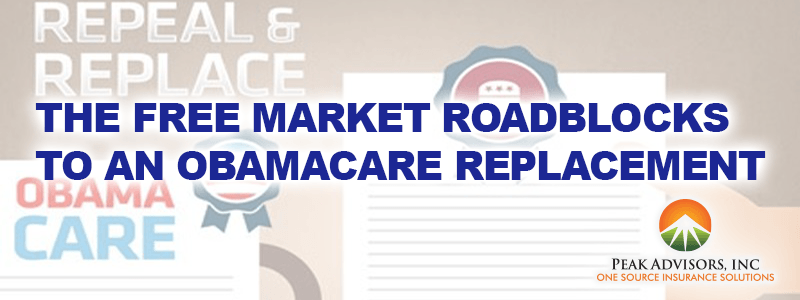
One would think it should be easy for Republicans to simply repeal Obamacare and come up with a lower cost and higher benefit replacement plan given they have control of all three branches of government, but there are free-market roadblocks hindering an Obamacare replacement. The problem with moving from a highly government regulated insurance plan under Obamacare to a free market-based plan is that there are three issues that must be overcome in the free market that hinders how easily a replacement plan can be implemented.
On one side, Republicans believe the government should leave the healthcare system to the open market, letting competition via supply and demand dictate prices and coverage.
On the other side, Democrats are upset at seeing many mandates in Obamacare end, likely resulting in the loss of essential benefits to millions who rely on the coverage.
While Republicans have control to do a full repeal and replace, the harder problem facing them are these three market-based roadblocks: Adverse Selection, Moral Hazard, and lack of Quantitative Information.
Adverse Selection: Allowing sick people to buy health insurance at any time, allowing them to not pay into the ‘pot’ until they need services. Obamacare controlled this by mandating all to have coverage. The Republican bill allows anyone to join a plan regardless of health condition; however they require a 30% higher premium when doing so for a full year. While this might help mitigate those higher cost members, it is difficult to see how any higher premium can offset the adverse selection inherent in allowing anyone to join a plan at any time. Do auto insurance companies allow you to buy insurance AFTER you have an accident? NY State had a much better fix for this problem pre-Obamacare: all carriers must accept anyone regardless of health conditions, however unless they had prior coverage for the past year, any pre-existing conditions would be exempted until they had continuous coverage for a full year. This prevented anyone from joining a plan just to get a health condition covered. It worked well and did not require any higher premiums to be charged.
Moral Hazard: Once someone has a high benefit insurance plan, there is less of an incentive to take care of themselves or limit their usage of doctor visits/medication as there is only a small copay required to utilize services. Having higher deductibles and/or sharing in the costs of services used (copays, co-insurance) helps to lower this moral hazard by making a member balance care with cost. Telemedicine is a good example of a way to lower moral hazard by allowing a low cost benefit to be used for low risk illnesses such as sore throat, pink eye, and earaches. A member with a deductible and co-insurance would have a financial stake in the treatment she chooses and might make her think twice about certain treatment options when lower cost alternatives would be available. Lowering over usage of services and having consumers share in the costs of services helps keep premiums down, while making consumers the watchdog of their insurance dollars.
Lack of quantitative Information: this roadblock comes from the lack of ability of a consumer to evaluate the need or quality of care of doctors and/or procedures. Is a doctor recommending multiple tests at an imaging facility because he or she has a financial stake in the facility being recommended? What are the outcomes of a doctor’s procedures and how are they measured against other providers? Having a standardized method of comparing this important information is vital to giving consumers the tools they need to purchase the care that makes the most financial sense and provides the best outcomes. While this comes with more government oversight, it is needed in a free market to avoid this roadblock.
Any final healthcare bill must address these three roadblocks in order to have a successful market-based healthcare system. There are definitely ways to combat each of these problems, but each comes with more government oversight. In the end, they must all be utilized to maintain a robust health insurance marketplace.